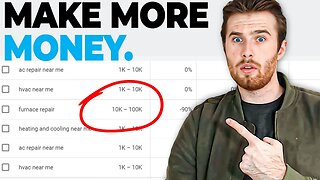Premium Only Content
![ECPC Google Ads (2022) - Enhanced CPC Google Ads [Tutorial]](https://1a-1791.com/video/s8/1/8/0/k/z/80kzf.qR4e-small-ECPC-Google-Ads-2022-Enhanc.jpg)
ECPC Google Ads (2022) - Enhanced CPC Google Ads [Tutorial]
In this video on ecpc google ads I will go over what enhanced CPC is inside google ads, how to use it, and what alternatives there are for an enhanced cost-per-click bidding strategy.
0:00 Intro
0:10 What is ECPC
2:07 Can You Still Use ECPC
2:13 Should You Use ECPC
2:43 How To Set Your Campaign To ECPC
Our Links (templates, services, courses, and more) https://linktr.ee/tradesmandigitalmarketing
Google Ads is an online advertising platform developed by Google, where advertisers bid to display brief advertisements, service offerings, product listings, or videos to web users. It can place ads both in the results of search engines like Google Search and on non-search websites, mobile apps, and videos.
About Enhanced CPC (ECPC)
Enhanced cost-per-click (ECPC) helps you get more conversions from manual bidding. ECPC works by automatically adjusting your manual bids for clicks that seem more or less likely to lead to a sale or conversion on your website. Unlike Target CPA and Target ROAS Smart Bidding, which automatically set bids based on your cost per conversion and return-on-ad-spend targets, ECPC will try to keep your average CPC below the max CPC you set (including bid adjustments) when optimizing for conversions.
For Search, Display, and Hotel campaigns, ECPC helps increase conversions while trying to keep your cost-per-conversion the same as you would get with manual bidding. For Shopping campaigns, ECPC helps increase conversions while trying to maintain the same overall spend. You can also set ECPC to optimize for conversion value, allowing you to prioritize high-value conversions and properly value different conversion actions. Optimizing for conversion value with ECPC is available for Search and Shopping campaigns. In this article, we’ll explain how ECPC works and how it can help you get more value for your ad budget.
Before you begin
To use Enhanced CPC with Search, Shopping, or Hotel campaigns, you’ll need to set up conversion tracking. You don’t need conversion tracking to use ECPC with Display campaigns, but conversions will help you learn whether your ads are effective.
How conversion tracking works with ECPC
The Google Ads system looks for patterns of clicks and conversions and compares them to your past results. If certain locations lead to more sales, for instance, it will know. You'll get optimal performance if you use conversion tracking with ECPC.
Make sure to review your conversion counting method for each conversion action to ensure it matches your goals. If you're tracking leads (such as sign-ups), you probably only want to count one conversion per ad click. If you're tracking sales, you probably want to count every conversion.
If you aren’t using conversion tracking
How ECPC works
Available as an optional feature with Manual CPC bidding, ECPC is a form of Smart Bidding that uses a wide range of auction-time signals such as browser, location, and time of day to tailor bids to the unique context of each search, but not to the full extent of other Smart Bidding strategies, such as Target CPA and Target ROAS.
ECPC looks for ad auctions that are more likely to lead to conversions, and then raises your max CPC bid (after applying any bid adjustments you've set) to compete harder for those clicks. If a click seems less likely to convert, Google Ads will lower your bid. ECPC will try to keep your average CPC below the max CPC you set (including bid adjustments), but may exceed your max CPC for short periods of time.
Example
Suppose you sell shoes both on your site and at a physical location, you’ve set your max CPC to $1 USD, and you have ECPC bidding turned on. If you set the value of store visit conversions to be higher than visits to your website, and Google Ads finds an auction that looks likely to lead someone to a store visit, it might set your bid to $1.70 USD for that auction. If another auction looks likely to lead to a website visit instead of a store visit, ECPC might lower your bid to $0.30 USD for that auction.
-
 20:00
20:00
Tradesman Digital Marketing
1 year agoHow and Why to Research Keywords In Google Ads (Tutorial) - This is URGENT
411 -
 1:39:57
1:39:57
Russell Brand
4 hours agoTYRANNY In Europe as Romanian Right-Wing Presidential Frontrunner BANNED from Elections – SF550
90.6K30 -
 DVR
DVR
vivafrei
5 hours agoMark Carney - Newly Anointed Prime Minister of Canada! Live with Rebel News' Ezra Levant! Viva Frei
43.7K28 -
 50:01
50:01
Ben Shapiro
3 hours agoEp. 2154 - Stephen A. Smith ATTACKS Me!
40.2K33 -
 1:20:26
1:20:26
Simply Bitcoin
3 hours ago $2.19 earnedBITCOIN CRASHED TO $78K: This Is When You Buy The Dip!! | EP 1199
28.9K1 -
 1:57:57
1:57:57
The Charlie Kirk Show
3 hours agoPardon Derek Chauvin + Buh-Bye, BLM + Destroy the Deficit | Sen. Scott, Ben Shapiro | 3.10.25
88.4K45 -
 58:52
58:52
The Dan Bongino Show
6 hours agoThe Left Can't Meme And Can't Win (Ep. 2438) - 03/10/2025
667K1.49K -
 1:01:32
1:01:32
The Rubin Report
4 hours agoTrump Addresses Rumors of Elon Musk & Rubio Clashing in Cabinet Meeting
64.7K35 -
 2:09:05
2:09:05
Steven Crowder
6 hours agoTrudeau Out, Carney In: Who Is Canada’s Anti-Trump Puppet?
453K271 -
 1:04:31
1:04:31
Timcast
5 hours agoDemocrat Machine IMPLODING, Biden AUTOPEN Scandal & ActBlue's COLLPASE Signal END Of Deep State
115K138